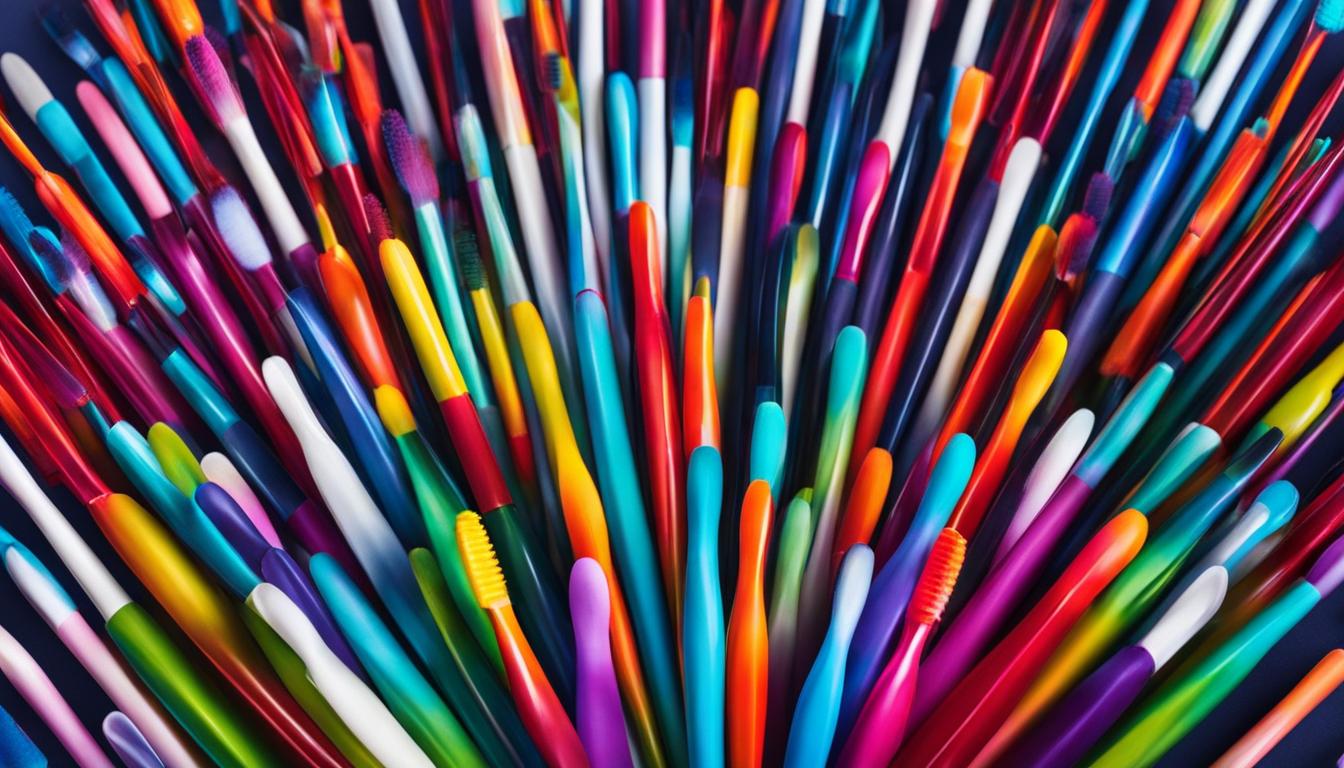When it comes to oral hygiene, toothbrushes are an essential tool in our daily routines. But did you know that there are some interesting facts about toothbrushes that you may not be aware of? In this article, we will explore eight surprising toothbrush facts that will amaze you. From the invention of electric toothbrushes to the benefits they offer, we will uncover the fascinating details that make toothbrushes more than just a mundane object.
Let’s dive into these toothbrush facts and discover how these little tools play a big role in our oral health. But first, take a look at this image of a classic electric toothbrush:
Proper Toothbrush Storage
Aside from regular replacement, proper toothbrush storage is also essential for maintaining oral hygiene. After each use, thoroughly rinse the toothbrush with water and allow it to air dry. Avoid storing toothbrushes in closed containers, as this can promote bacterial growth. Instead, store toothbrushes upright in a clean, well-ventilated area.
Furthermore, it is essential to store toothbrushes at least six feet away from the toilet to prevent the spread of bacteria. Closing the toilet lid before flushing can also help minimize the dispersal of germs through the air. By following these simple storage practices, you can ensure that your toothbrush remains clean and hygienic between uses.
Optimal Brushing Pressure
When it comes to maintaining optimal oral health, the pressure you apply while brushing plays a crucial role. Using a toothbrush with soft bristles is highly recommended to avoid damaging your gums. Soft bristles are gentle yet effective in removing plaque and debris from your teeth without causing irritation or discomfort.
Applying too much pressure while brushing can have detrimental effects on your enamel and gums. Excessive pressure can lead to enamel erosion, which weakens the protective layer of your teeth, making them more prone to tooth decay and sensitivity. Additionally, aggressive brushing can cause gum recession and damage to the delicate gum tissue.
To ensure you’re using the correct brushing pressure, keep in mind two key aspects:
- Hold the toothbrush at a 45-degree angle against your gum line and use gentle, circular motions. Avoid vigorous scrubbing or back-and-forth motions, as this can lead to gum irritation and enamel wear.
- Let the bristles do the work for you. There’s no need to apply excessive force or press the bristles too hard against your teeth. Allow the brush to glide smoothly over your teeth, using the delicate bristles to clean effectively.
By using a toothbrush with soft bristles and applying gentle, controlled pressure, you can maintain the health of your teeth and gums. Remember that proper brushing technique, combined with regular dental check-ups and flossing, is key to achieving optimal oral hygiene.
Finding the Right Toothbrush
Finding a toothbrush with the right balance of softness and effectiveness can make all the difference in your oral care routine. Look for toothbrushes labeled “soft” or “extra soft” to ensure a gentle yet thorough cleaning experience. Consider trying different toothbrush brands and models until you find one that suits your needs and preferences.
It’s also important to replace your toothbrush every three to four months or sooner if the bristles become frayed or worn. A worn-out toothbrush won’t effectively clean your teeth, and the bristles can harbor bacteria, potentially leading to oral health issues.
Recommended Brushing Time
Proper brushing technique plays a vital role in maintaining optimal oral health. However, simply brushing regularly is not sufficient. The duration of brushing also matters to ensure that your teeth are thoroughly cleaned. The recommended brushing time for each session is two minutes, twice a day.
Two minutes may seem like a long time, but it provides enough opportunity to clean all surfaces of your teeth and remove plaque effectively. To make it easier to keep track of time, consider using a timer or an electric toothbrush with a built-in timer.
Dividing the brushing time into quadrants can help ensure that you give equal attention to all areas of your mouth. Spend about 30 seconds on each quadrant, focusing on both the front and back surfaces of your teeth, as well as your tongue.
Brushing for the recommended time is an essential part of your oral hygiene routine. By dedicating two minutes to each brushing session, you’ll significantly improve your oral health, reduce plaque buildup, and maintain a beautiful smile.
Avoiding Toothbrush Sharing
When it comes to maintaining oral hygiene, using your own toothbrush is crucial. Sharing toothbrushes may seem convenient, but it can actually lead to the transfer of harmful bacteria. A wet toothbrush, in particular, can become a breeding ground for billions of bacteria, increasing the risk of oral infections and diseases.
Using individual toothbrushes for each person in your household is essential to prevent the spread of bacteria. By doing so, you can ensure that you are not putting your oral health at risk and maintain a clean and healthy mouth.
Importance of Dental Check-ups
Regular dental check-ups and cleanings play a vital role in achieving optimal dental and overall physical health. These routine visits to the dentist help identify and address potential oral health issues before they become more severe.
Dental professionals have the expertise to detect early signs of tooth decay, gum disease, and oral cancer, ensuring timely intervention and treatment. Through comprehensive examinations, dentists can assess the health of your teeth, gums, and surrounding tissues, providing guidance and personalized care based on your specific needs.
In addition to examining your oral health, dental check-ups include professional cleanings to remove plaque and tartar buildup, which can contribute to tooth decay and gum disease. Even with diligent brushing and flossing at home, certain areas of the mouth may be difficult to clean thoroughly, making professional cleanings essential for maintaining oral hygiene.
Dental check-ups also allow dentists to evaluate your oral hygiene routine, providing recommendations for improvement and addressing any concerns you may have. They can offer guidance on proper brushing and flossing techniques, the use of oral care products, and advice on maintaining a healthy diet for optimal oral health.
Remember, prevention is always better than cure. Regular dental check-ups are an investment in your oral health, helping to prevent more extensive, costly, and potentially painful dental treatments in the future.
To maintain excellent oral health, it is generally recommended to visit your dentist every six months. However, the frequency of dental check-ups may vary depending on your specific needs and any existing oral health conditions.
Make dental check-ups a priority to ensure a healthy smile that lasts a lifetime.
Conclusion
Throughout history, toothbrushes have played a vital role in dental health and oral hygiene. From the invention of the first toothbrush with bristles to the modern electric toothbrushes of today, these tools have evolved to effectively remove plaque and promote a healthy smile.
Regular brushing and flossing, along with dental check-ups, are fundamental in maintaining optimal oral hygiene. By incorporating these practices into a daily routine, individuals can reduce the risk of plaque buildup, gingivitis, and other dental issues.
It is essential to choose toothbrushes that bear the seal of approval from the American Dental Association (ADA). These toothbrushes are scientifically proven to effectively remove plaque and bacteria, safeguarding dental health.
With proper care, knowledge, and consistent oral hygiene practices, toothbrushes can contribute significantly to achieving a healthy and radiant smile. By investing time and effort into dental health, individuals can maintain a lifelong commitment to excellent oral hygiene.







